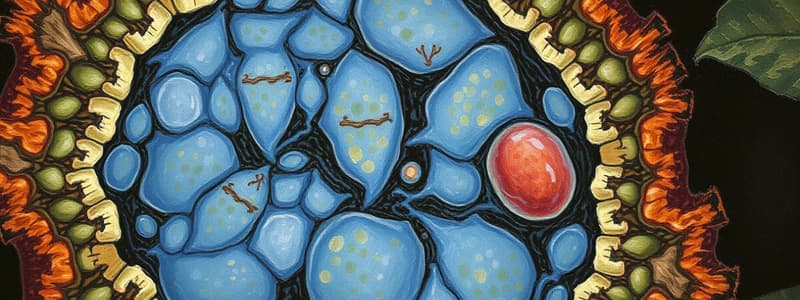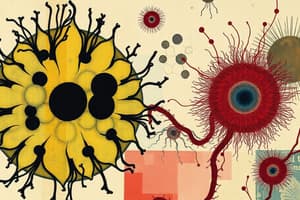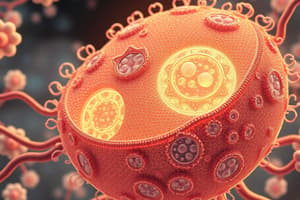Podcast
Questions and Answers
What are the three major parts of a eukaryotic cell?
What are the three major parts of a eukaryotic cell?
- Nucleus, Cytoplasm, Golgi Apparatus
- Mitochondria, Nucleus, Cytoplasm
- Nucleus, Cytoplasm, Cell Membrane (correct)
- Cell Membrane, Cytoplasm, Ribosomes
What is one of the essential properties of water that helps cool the body?
What is one of the essential properties of water that helps cool the body?
- High heat capacity
- Polarity
- High heat of vaporization (correct)
- Cushioning effect
Which organelle is primarily responsible for protein synthesis?
Which organelle is primarily responsible for protein synthesis?
- Nucleus
- Mitochondria
- Ribosomes (correct)
- Smooth ER
Which of the following substances is considered a bioorganic component of cells?
Which of the following substances is considered a bioorganic component of cells?
What role do buffers play in biological systems?
What role do buffers play in biological systems?
What is the main function of the nucleus in a eukaryotic cell?
What is the main function of the nucleus in a eukaryotic cell?
What is the primary function of mitochondria in a cell?
What is the primary function of mitochondria in a cell?
Which component of the cytoplasm refers to the liquid part where organelles are suspended?
Which component of the cytoplasm refers to the liquid part where organelles are suspended?
Which organelle is responsible for producing RNA and proteins?
Which organelle is responsible for producing RNA and proteins?
Which of the following is NOT a classification of organelle function?
Which of the following is NOT a classification of organelle function?
How does the cell membrane function in terms of cell communication?
How does the cell membrane function in terms of cell communication?
What is the primary role of lysosomes within the cell?
What is the primary role of lysosomes within the cell?
What is the main function of the Golgi apparatus?
What is the main function of the Golgi apparatus?
Flashcards are hidden until you start studying
Study Notes
Learning Objectives
- Understand the three major parts of a eukaryotic cell: nucleus, cytoplasm, and cell membrane
- Explain the significance of water, buffers, and mineral ions in cellular function
- Identify organelles and classify their roles: regulatory, defense, synthesis, transport
- Recognize biochemical substances found in cell organelles
Biochemistry Overview
- Focus on chemical substances in living organisms and their interactions
- Inorganic substances include water, buffers, and mineral ions
- Bioorganic substances consist of:
- Proteins (15%)
- Lipids (8%)
- Carbohydrates (2%)
- Nucleic acids (2%)
- Enzymes and energy-rich compounds
Water Properties
- Comprises 60-80% of body weight
- High heat of vaporization for effective body cooling
- High heat capacity to stabilize temperature
- Acts as a polar solvent for ionic substances
- Essential for hydrolysis and dehydration synthesis
- Provides cushioning to protect organs
Buffers
- Maintain stable pH despite acid or base additions
- Crucial for biological system balance and survival
Eukaryotic Cell Structure
- Basic unit of life, containing specialized organelles
- Organelles serve specific functions: regulatory, transport, synthesis, defense
Major Parts of the Cell
- Nucleus
- Control center for cellular activities
- Houses DNA; site for nucleic acid biosynthesis
- Nucleolus synthesizes RNA and proteins; contains chromosomes with histone proteins
- Cytoplasm
- Substance encompassing the nucleus where metabolic activities occur
- Contains organelles and cytosol (liquid portion)
- Key organelles include:
- Ribosomes (protein synthesis)
- Smooth Endoplasmic Reticulum (lipid synthesis, detoxification)
- Lysosomes (hydrolytic enzymes for digestion)
- Mitochondria (ATP production via cellular respiration)
- Cell Membrane
- Phospholipid bilayer encloses cytoplasm
- Embedded proteins and cholesterol enhance fluidity
- Functions include selective permeability and facilitating intercellular communication
Key Organelles
- Nucleus: Nucleic acid synthesis
- Nucleolus: Produces RNA and proteins
- Ribosomes: Sites for protein synthesis
- Lysosomes: Digestion via hydrolytic enzymes
- Mitochondria: ATP generation through the electron transport chain
- Golgi Apparatus: Modifies proteins, packages secretions, synthesizes carbohydrates
- Peroxisomes: Fatty acid breakdown, free radical neutralization
Important Concepts
- Electron Transport Chain: Occurs in mitochondria; produces ATP through electron transfers
- Buffers: Key for maintaining critical pH levels for cellular function
- Cell Membrane: Regulates balance of salts, water, and organic matter essential for life
Summary of Biochemical Substances in Organelles
- Nucleus: Contains nucleic acids, proteins, lipids
- Nucleolus: Composed of RNA, proteins
- Ribosomes: Made of RNA, proteins
- Lysosomes: Contain hydrolytic enzymes (proteins)
- Mitochondria: Consist of proteins, carbohydrates, nucleic acids, ATP
- Golgi Apparatus: Includes proteins, carbohydrates, lipids
- Cell Membrane: Contains proteins, lipids, carbohydrates
Studying That Suits You
Use AI to generate personalized quizzes and flashcards to suit your learning preferences.




